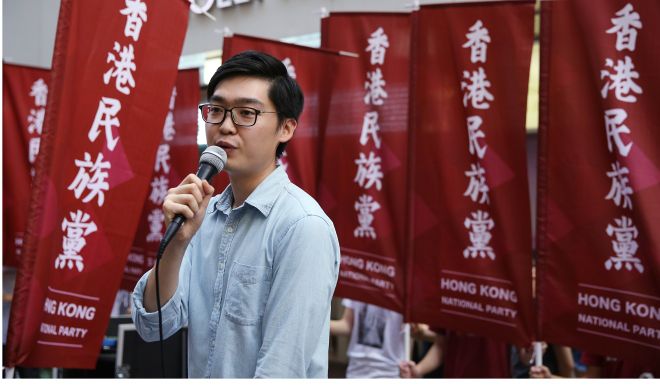Hong Kong moves to crush pro-independence party

It has been little more than two years since the pro-independence Hong Kong National Party was founded. According to reports today, the Hong Kong government seems intent on making sure it doesn’t live to see two and a half.
- This morning, police officers visited the home of Andy Chan Ho-tin 陳浩天, the leader of the party, and gave him documents that indicated the government wanted the party “banned from operating using the Societies Ordinance on the grounds of national and public security,” the Hong Kong Free Press reports.
- The party was then given a 21-day ultimatum by Hong Kong’s security secretary, John Lee, who challenged the party “to justify why it should not be banned,” the Hong Kong Free Press says.
- Hong Kong’s “Societies Ordinance,” specifically section 8(1)(a), allows the government to break up any group of one or more if it believes that it is “necessary in the interests of national security or public safety, public order or the protection of the rights and freedoms of others.”
- This is the first time since 1997 — the year Beijing officially gained sovereignty over Hong Kong — that section 8(1)(a) of the Societies Ordinance has been applied. Pro-democracy camp convener lawmaker Charles Mok noted that the law was intended to crack down on organized crime Triads, and that it was “rather ridiculous” to use it to censor political speech.
- If the party is banned, a fine of HK$50,000 ($6,370) and two years in prison will be applied to any person who attends meetings of the party or donates money to it.
- Chan had tried to register the political party in March 2016 when it was founded, but had been rejected by the Companies Registry for “political reasons.” Chan was later himself barred from standing for election in the city, after he refused to renounce his pro-independence position.
As with many recent years, the last year in Hong Kong politics has been a tumultuous one. Here is how we summarized political news in the city in 2017 in our The China Project Red Paper (a paywalled product, but free for The China Project Access members):
Hong Kong grew agitated as pro-Beijing forces gained influence. Carrie Lam 林鄭月娥 was selected as the territory’s next chief executive by a ballot of around 1,200 business and political leaders in March. One of her government’s first moves was to arrest nine democracy advocates for years-old public disturbance charges. This culminated in August, as Alex Chow 周永康, Nathan Law 罗冠聪, and Joshua Wong 黃之鋒 were sentenced to short jail terms for taking part in an “unlawful assembly” that kicked off the 79-day “Umbrella Movement” protests of 2014. Their jailing sparked an “anti-authoritarian” protest of tens of thousands on October 1, which focused its anger on the city’s secretary of justice, Rimsky Yuen. Wong and Law were granted bail on October 24. Meanwhile, Hong Kong celebrated the 20th anniversary of its return to the mainland with a visit by Xi Jinping, and in October, Beijing banned protests of the Chinese national anthem, a law that is expected to be separately enacted in Hong Kong and affect student protests there.
In 2018, the city moved forward with that national anthem law (Access paywall), controversially allowed mainland Chinese police to control part of a train station, and saw another rocky anniversary (Access paywall) on July 1 of its handover to PRC sovereignty.
As Nathan Law, a leader in Hong Kong’s democracy-advocating Demosisto Party — whose application at the Companies Registry was also rejected — put it, “I believe we will face more suppression in the future.”






